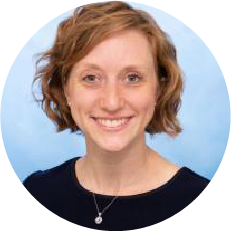

Calista Harbaugh

Calista Harbaugh
M.D., M.Sc.
2017–19 NATIONAL Clinician Scholar
Assistant Professor, Division of Colorectal Surgery, University of Michigan
Calista Harbaugh, M.D., M.Sc., completed the National Clinician Scholars Program (NCSP) at IHPI in 2019 while in her General Surgery residency at U-M. Harbaugh’s research during the program focused on surgery-related opioid prescribing and pain management for children, adolescents, and young adults.
One of Harbaugh’s studies during the program used health insurance claims data to examine longer term outcomes after wisdom tooth extraction, a procedure for which some 5 million generally young and healthy Americans are routinely prescribed opioids – even though evidence shows that over-the-counter medications are just as effective for pain. The study, which was published in the Journal of the American Medical Association, found that young people who filled an opioid prescription immediately before or after having wisdom teeth removed were nearly three times as likely as those who did not to develop long-term opioid use.

Through this research, Harbaugh honed her skills in using large databases to better understand the long-term impacts of opioid prescribing and gain a more comprehensive view of post-surgical care. The work also led to widespread media coverage and heightened public awareness of the issue, and, for Harbaugh, several radio interviews and presentations at national professional conferences. She was also subsequently invited to provide the resident perspective on a American Pediatric Surgical Association guidelines committee for perioperative opioid prescribing.
Harbaugh credits the NCSP with preparing her well for these opportunities. “Through the program, you’re really challenged to translate findings and communicate them in a different and meaningful way," she says. "And a big part of developing your messaging involves coming back to why you are doing this work in the first place – it’s not just to write a paper, it’s really to change care,” she says.
During the NCSP, Harbaugh was also involved with a multidisciplinary task force at Mott Children's Hospital to improve the quality of care for pediatric surgical patients, with a particular focus on opioids and pain management. The task force conducted a large survey of parents whose children had surgery at Mott, which identified practical opportunities to close gaps around opioid storage, disposal, and education around pain management and opioid use. Another survey of providers examined perspectives on opioid prescribing patterns for different procedures. “What we realized is that opioid prescribing and pain management are inextricably linked, and it's really hard to move the needle in one without addressing the other,” Harbaugh says.
“The experience was a really nice dovetail between these more scientific approaches to understanding care and quality improvement work, where we could feed some of this data back, including input from providers across the spectrum, who were key to implementing some really innovative solutions throughout the care pathway,” she says.
“Through the program, you’re really challenged to translate findings and communicate them in a different and meaningful way.”
– Calista Harbaugh
After completing the NCSP, Harbaugh switched her focus to colorectal surgery, and after her fellowship she joined the U-M colorectal surgery faculty in 2022. Harbaugh currently practices at both U-M and Chelsea Community Hospital.

Today her research interests include the quality of care delivery for colorectal cancer, the third-most common cancer diagnosed in men and women in the U.S., against the backdrop of rapid hospital system consolidation and its implications for individual patient care. “Because they are so common, the vast majority of these cancers are taken care of in the community,” Harbaugh says. Trends toward centralizing the location of care for these patients within a larger hospital network may not consider some key issues that are meaningful for individual patients and can significantly influence outcomes, like having to travel longer distances for care, or being further away from a local support system, she explains. “How do we understand what quality means across huge hospital networks, and what are our leverage points for improving care?”
“Even though my topic focus has shifted, the NCSP helped me build a strong foundation in how to study these new questions, as well as how to think strategically about how my research questions build upon one another,” Harbaugh says. “You’re taught how to think beyond a single study and work to develop a research program.”
September 2023